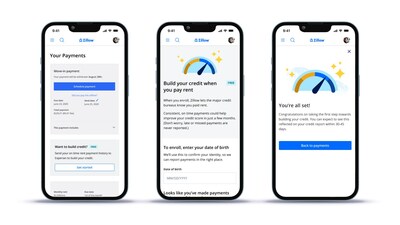Zillow empowers renters with credit-building payment reporting
- None.
- None.
Insights
The introduction of Zillow's feature for renters to build credit history is a strategic move that may potentially reshape the rental marketplace landscape. As a market research analyst, it's important to note that this initiative addresses a key pain point for a significant portion of the population, particularly the 26 million 'credit invisible' Americans. By providing a pathway for renters to establish and improve credit scores, Zillow is not only enhancing its value proposition but also potentially increasing user engagement and retention on its platform.
Moreover, this move could have a ripple effect on the housing market, as improved credit access may enable more renters to transition to homeownership. It's also likely to influence competitor strategies, possibly leading to a new standard where rent reporting becomes an expected service in online rental marketplaces. This could result in heightened competition and innovation within the sector.
However, the long-term success of this feature will depend on the extent to which credit bureaus and lenders recognize and incorporate rent payment data into their credit scoring models. If widely accepted, Zillow may see an increase in its user base, as renters who are looking to build their credit history might prefer platforms that offer such services. This could translate to a larger market share and potentially, increased revenue streams for Zillow.
From a financial perspective, Zillow's introduction of a rent reporting feature is a forward-looking investment in customer loyalty and market differentiation. This service can be seen as a value-added feature that may attract a new user demographic, potentially leading to increased market penetration. If successful, the feature could enhance Zillow's revenue model by driving higher traffic and engagement, which in turn could attract more landlords and advertisers to the platform, thereby increasing advertising revenue and listing fees.
It's also important to consider the cost structure of implementing such a feature. Given that it is offered at no cost to renters or landlords, Zillow will need to absorb the operational costs. However, if this feature leads to increased platform usage and retains a higher number of users, the long-term benefits could outweigh the initial expenditures. Furthermore, positive financial implications could be reflected in Zillow's stock performance if investors view this innovation as a catalyst for future growth.
Investors and stakeholders should monitor the adoption rate of the rent reporting feature and its impact on Zillow's user metrics. An increase in active users and time spent on the platform could be indicative of the feature's success and its contribution to the company's financial health.
Examining the broader economic implications, Zillow's initiative to facilitate credit-building for renters could have a stimulating effect on the economy. By potentially increasing the number of individuals with access to credit, there may be a downstream impact on consumer spending and borrowing. This could lead to a more inclusive financial system where a greater number of individuals are able to make significant financial decisions, such as purchasing a home or starting a business.
Furthermore, addressing the credit disparity in historically marginalized communities, as highlighted in the case of Black communities in New Orleans, aligns with broader economic goals of reducing inequality and promoting financial inclusion. If successful, Zillow's program could serve as a model for other companies to contribute to economic empowerment through innovative services.
However, the effectiveness of this initiative in driving economic inclusion will depend on various factors, including the extent to which credit history built through rent payments is valued by financial institutions. Should this initiative gain traction, it could encourage a reassessment of traditional credit scoring methods, potentially leading to a more holistic approach to creditworthiness evaluation.
Innovative new feature helps renters build a credit history at no cost to them or their landlord
Zillow's rent reporting program is rooted in the recognition of a significant gap in credit reporting. Despite renters in the
Recent research by Zillow highlights the importance of this issue, particularly in Black communities, where residents often pay more in rent than they would toward a mortgage. This is due, at least in part, to limited credit access — a remnant of historic redlining. For example, in
Reporting on-time rent payments can help renters build or enhance their credit history, an important step in accessing broader financial opportunities. Higher credit scores can potentially lead to easier loan approvals as well as better rates for home purchases, credit cards, future rentals and more, with the impact varying based on the credit scoring model that lenders use.
"Every on-time rent payment is a testament to a renter's reliability, yet it's often overlooked in credit reports, and we want to change that," said Michael Sherman, vice president of Zillow Rentals. "This new program is all about acknowledging and supporting consistent financial habits. It ensures renters' largest expense can now work in their favor and potentially help them on their path to finding and securing a place they can call home."
All renters who use Zillow to pay their rent can opt in to this feature for free. Once a renter decides to opt in, Zillow will report on-time rent payments to Experian, a major credit bureau.
How rent reporting on Zillow works
Zillow's rent reporting feature is designed for ease and efficiency, providing renters with a straightforward, secure path to building credit. Here's an overview of the process:
- Opt In: Renters already utilizing Zillow for rent payments can enable rent reporting via their Renter Payments Dashboard on Zillow. New renters will be asked if they'd like to opt in when they enroll in the service.
- Payment Tracking: Once a renter opts in to this service, Zillow identifies on-time rent payments, defined as payments made within 30 days of their due date.
- Credit Reporting: These on-time payments are then reported to Experian on a monthly basis. Late payments, defined as those more than 30 days past due, are not reported by Zillow.
After the user's enrollment, the process is automatic. Zillow continues to report the renter's on-time monthly rent payments without requiring further action from the renter. Renters may opt out of rent reporting at any time. Zillow is committed to broadening this service while consistently offering valuable solutions that benefit renters.
This launch is part of Zillow's commitment to creating tools to empower individuals in their housing journey. It complements Zillow's comprehensive marketplace for buying, selling and renting properties, showcasing our dedication to streamlining the process to get more people home.
About Zillow Group
Zillow Group, Inc. (NASDAQ: Z and ZG) is reimagining real estate to make home a reality for more and more people. As the most visited real estate website in
Zillow Group's affiliates, subsidiaries and brands include Zillow®, Zillow Premier Agent®, Zillow Home Loans℠, Trulia®, Out East®, StreetEasy®, HotPads®, ShowingTime+℠, Spruce® and Follow Up Boss®.
All marks herein are owned by MFTB Holdco, Inc., a Zillow affiliate. Zillow Home Loans, LLC is an Equal Housing Lender, NMLS #10287 (www.nmlsconsumeraccess.org). © 2023 MFTB Holdco, Inc., a Zillow affiliate.
(ZFIN)
![]() View original content to download multimedia:https://www.prnewswire.com/news-releases/zillow-empowers-renters-with-credit-building-payment-reporting-302036049.html
View original content to download multimedia:https://www.prnewswire.com/news-releases/zillow-empowers-renters-with-credit-building-payment-reporting-302036049.html
SOURCE Zillow









